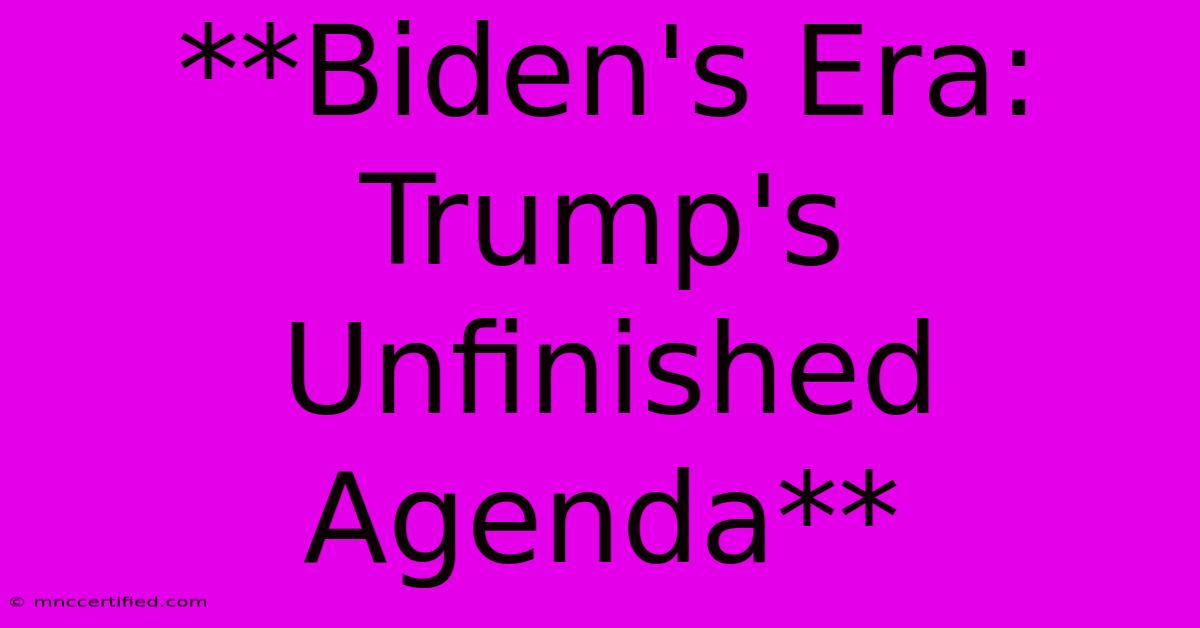**Biden's Era: Trump's Unfinished Agenda**

Table of Contents
Biden's Era: Trump's Unfinished Agenda – A Legacy in Limbo?
The 2020 US Presidential election ushered in a new era with the inauguration of Joe Biden. While the political landscape shifted dramatically, echoes of the Trump administration's policies and agenda continue to reverberate, raising questions about how much of it remains unfinished.
The "America First" Legacy: An Ongoing Debate
Trump's "America First" agenda, characterized by protectionist trade policies, immigration restrictions, and a withdrawal from international agreements, left an undeniable mark on the nation's political landscape. These policies, often controversial, continue to spark debate and influence Biden's approach to international relations and domestic issues.
Trade: Trump's renegotiation of NAFTA into the USMCA, while aimed at protecting American jobs, has been met with mixed reactions. Biden has largely maintained this agreement, though he's also sought to address concerns about labor standards and environmental protection.
Immigration: The construction of the border wall, a signature promise of Trump's campaign, remains an unfinished project. Biden halted further construction, but the issue of immigration reform, including addressing the status of undocumented immigrants, remains unresolved.
Foreign Policy: Trump's withdrawal from the Iran nuclear deal, the Paris climate agreement, and the World Health Organization have left a lasting impact on US global standing. Biden has rejoined these agreements, signaling a return to multilateralism, but challenges remain in repairing damaged relationships and restoring international trust.
Economic Policies: A Shift Towards Moderation?
Trump's economic policies, including tax cuts and deregulation, aimed to boost economic growth and job creation. Biden, while embracing some aspects of these policies, has shifted the focus towards addressing income inequality, promoting clean energy, and investing in infrastructure.
Tax Cuts: While Biden has proposed raising taxes on corporations and high-income earners, he has also called for extending some of Trump's tax cuts for middle-class families. This reflects a balancing act between addressing income inequality and maintaining economic growth.
Infrastructure: Biden's infrastructure plan, a major initiative of his presidency, aims to invest heavily in roads, bridges, broadband, and clean energy, creating jobs and stimulating economic activity. This departs from Trump's focus on deregulation, highlighting a broader government role in economic development.
The Pandemic and Beyond: Unresolved Issues
The COVID-19 pandemic, which began during Trump's presidency, has continued to be a major challenge for Biden. His administration has prioritized vaccine distribution and economic recovery, but the pandemic's long-term economic and social consequences remain to be seen.
Pandemic Response: While Biden has reversed many of Trump's pandemic policies, including mask mandates and travel restrictions, the ongoing pandemic has exposed vulnerabilities in the US healthcare system and highlighted the need for comprehensive reforms.
Social and Political Polarization: Trump's presidency, marked by divisive rhetoric and policies, has exacerbated social and political polarization. This divide persists under Biden, raising questions about the future of American democracy and the potential for healing.
Looking Ahead: A Legacy in the Making
The debate surrounding Trump's legacy continues. While some of his policies have been reversed, others remain in place, and their long-term effects are still unfolding. Biden's presidency is shaping a new chapter in American history, but it is a chapter that is undeniably intertwined with the policies and controversies of the Trump era.
The extent to which Trump's agenda remains unfinished, and how Biden's policies will ultimately shape the future of the nation, are questions that will continue to be debated and explored for years to come.

Thank you for visiting our website wich cover about **Biden's Era: Trump's Unfinished Agenda**. We hope the information provided has been useful to you. Feel free to contact us if you have any questions or need further assistance. See you next time and dont miss to bookmark.
Featured Posts
-
Inauguration Day Trump Takes Office
Nov 07, 2024
-
West Indies Bowling Attack Leads Decider Changes
Nov 07, 2024
-
Barcelona Vs Estrella Roja All Champions League Goals
Nov 07, 2024
-
Nerve Conduction Study Cost With Insurance
Nov 07, 2024
-
California Prop 36 Theft Law Changes
Nov 07, 2024